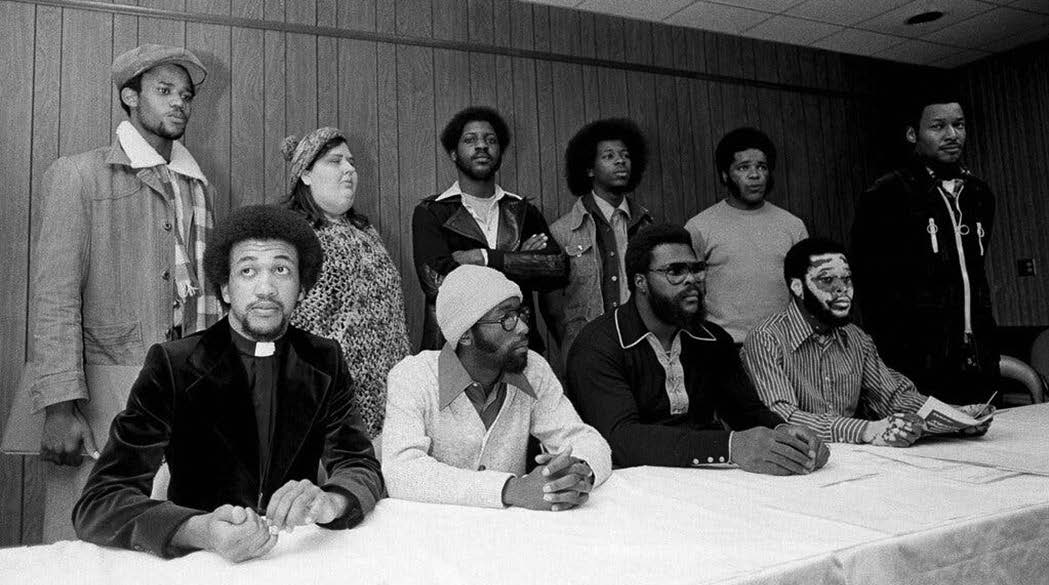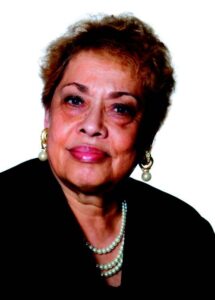Remembering Mary Alice Thatch and the 10th Anniversary of The Wilmington Ten Pardons of Innocence
By Cash Michaels, Peacemaker Senior Contributor / January 6, 2023Ten years ago on this date, January 5, 2013, North Carolina history was made when the seven surviving members of the Wilmington Ten – ten social activists who more than 40 years earlier had been falsely convicted of firebombing a White-owned grocery store and firing weapons on firefighters and police officers in a riot-torn Wilmington, N.C. in February 1971 – received their official pardons of innocence.
Then N.C. Gov. Beverly Perdue, on her last day in office on December 31st, 2012, signed the certificates, effectively exonerating the Ten – nine Black men and one White woman, three of them posthumously – of the false charges.
Both historic events a decade ago this week, were the direct result of the advocacy and leadership of late Wilmington Journal publisher/editor Mary Alice Jervay Thatch, who convinced the 200-member National Newspaper Publishers Association (NNPA) to sanction a campaign in March 2011 to have the Wilmington Ten pardoned.
The story is recounted in a new short film titled, “The Legacy of Mary Alice Jervay Thatch,” which will be shown at the upcoming 22nd Annual African American Cultural Celebration at the N.C. Museum of History in Raleigh on Saturday, January 28th, from 3:30 to 4 p.m.
Mrs. Thatch, 78, died just a year ago on December 28, 2021. But upon her death, she was roundly heralded for being a staunch African American community leader and believer that “There is power in the Black Press.”Winning pardons of innocence for the Wilmington Ten is widely considered the hallmark of her journalistic career.
It was February of 2011 when Bill Saffo, the mayor of Wilmington, presided over the 40th anniversary commemoration of the Wilmington Ten at UNC – Wilmington. Saffo publicly apologized to the surviving members of the Ten “…who were done a tremendous injustice by our judicial system…”
Letters of apology were handed out on stage to the surviving members, as the audience applauded.
But some in the audience, like Wilmington Journal Publisher/editor Mary Alice Thatch, felt that letters of apology weren’t enough for what the Ten had gone through. Thatch called Dorothy Leavell, publisher of the Chicago Crusader, and president of the NNPA Foundation, recommending that the Black newspaper association take up the cause of the Wilmington Ten on the pages of its member papers.
Leavell agreed, and the following month, during its annual Black Press meeting in Washington, D.C., the NNPA formally adopted getting pardons for the Wilmington Ten as a campaign.
The problem was, no one really knew how to go about attaining pardons, so the NNPA campaign stalled for the rest of 2011.
In 2012, realizing that no progress had been made, Mrs. Thatch asked her chief reporter, Cash Michaels, to work with her to help coordinate the effort. Thatch decided that a committee was needed. But before one could be constituted, Duke University historian Tim Tyson was called by Michaels to possibly help with what would be known as the “Wilmington Ten Pardons Project.”
Prof. Tyson was well versed in Black history, so Michaels felt he could lend an important perspective.
Tyson did more than that. He had a box of paperwork and notes from the original 1972 Wilmington Ten trials (there were two, the first being aborted after an all-Black jury was seated, and the White prosecutor became “sick” to make sure that they never heard the case. The second trial had a mostly White, “KKK” jury).
The box of trial notes proved that the prosecutor set out to seat a racially biased jury, allowing only two “docile” Blacks who would go along with the Whites when a verdict was reached.
The box of handwritten prosecution notes – which had unbelievably been in a closet in the New Hanover County District Attorney’s Office for virtually 40 years – could prove that the prosecution framed the Wilmington Ten, falsely convicting them of arson and attempting to murder police officers and firefighters.
Irving Joyner, one of the original defense attorneys, had agreed to work with Mrs. Thatch in the new pardons effort, noting that what they were really after were pardons of innocence, which denote that a convicted person actually did not commit a crime, versus a pardon, which is official forgiveness for a crime committed.
Joyner contacted lead defense attorney James Ferguson in Charlotte.
The pair reviewed the box of prosecution notes and files from the trials that were held in the Pender County Courthouse in Burgaw, and filed the necessary legal paperwork with the Governor’s office.
Michaels, at the direction of Mrs. Thatch, wrote stories not just for the Wilmington Journal, but for NNPA Black newspapers across the state and the nation, detailing how the Wilmington Ten prosecutor, working in tandem with the judge for the second trial, did everything in his power to manipulate the “KKK” jury that was empaneled to ensure guilty verdicts.
Wilmington Ten leader Rev. Benjamin Chavis was included in the strategizing, as was the Rev. Dr. William Barber, then president of the N.C. NAACP, who put public pressure on Gov. Perdue.
The strategy was simple – don’t antagonize Perdue with raucous demonstrations. She had already proven to be on the side of the African American community on most issues.
Keeping in constant contact with the governor’s closest aides, the Pardons of Innocence project also contacted the editorial writers at The New York Times, The News and Observer, and even the Star News, the Wilmington White newspaper that 40 years earlier condemned the Wilmington Ten.
All issued editorials calling on Gov. Perdue to issue pardons of innocence, as did cable channel MSNBC. A national petition drive conducted by the progressive group Change.org, along with the national NAACP and the Wilmington Journal generated over 150,000 signed petition signatures that were delivered to the governor’s State Capitol office.
At one point, supporters had received unconfirmed word that Perdue was considering just pardons as a way to placate those who demanded that the Ten remain guilty in the eyes of history.
Rev. Chavis stood up at First Baptist Church in Raleigh, declaring that if the governor was issuing just pardons, and not pardons of innocence, he wouldn’t accept, because he had committed no crime.
As 2012 was coming to a close, there was no word from Gov. Perdue. Supporters knew it was either her or nothing, because her term ended after Dec. 31st, and the new governor, Pat McCrory, a Republican, would never entertain issuing the pardons of innocence.
Then, on Dec. 31st. Michaels received a call at home from the Governor’s Office.
Gov. Perdue had signed ten pardons of innocence, all for the Wilmington Ten. The news was reported across the nation and the world.
Five days later, at Gregory Congregational church in Wilmington, a ceremony was held where all seven serving members of the Wilmington Ten received their official certificates before a packed church.
When Mary Alice Jervay Thatch was introduced to speak, the audience all stood to their feet, and enthusiastically applauded.
Mrs. Thatch smiled, and then proceeded to tell the community what a glorious day it was, and though it took over 40 years, justice had finally come to the Wilmington Ten.
EDITOR’S NOTE – As part of the 22nd Annual African American Cultural Celebration on Saturday, January 28th at the N.C. Museum of History, 5 East Edenton Street in Raleigh, there will be a special presentation, “The Legacy of Mary Alice Jervay Thatch,” in the Longleaf Classroom, SECU Education Center, Level R from 3:30 to 4 p.m. Admission is free to the public.









